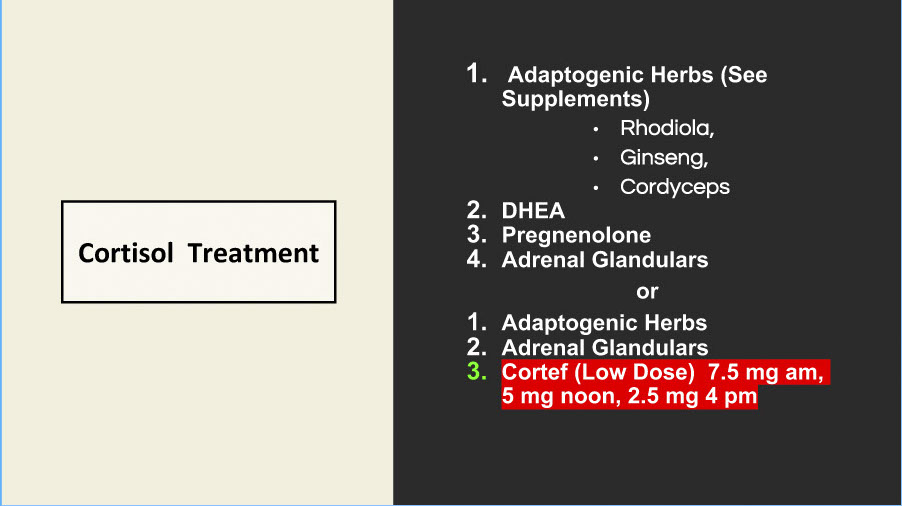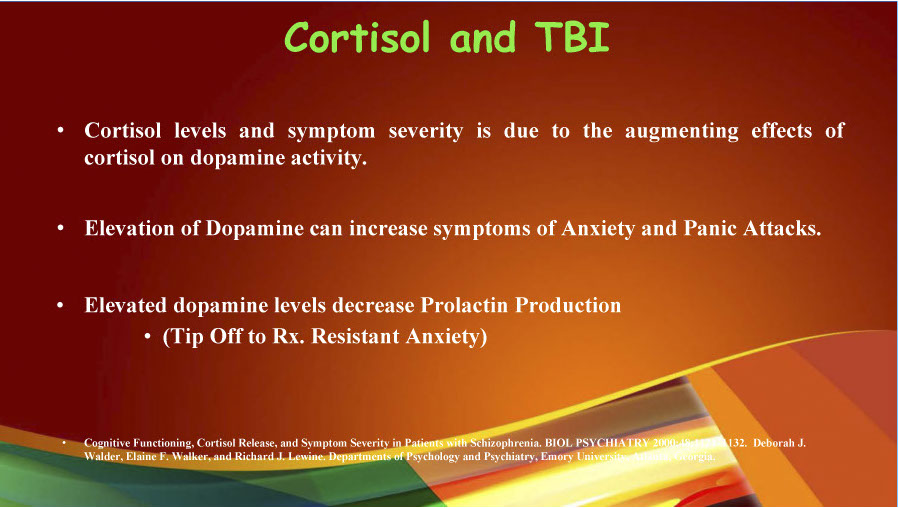Page Synopsis: Technical stuff here, you don't have to understand it, but Cortisol is a big player in CFS. Balance Cortisol levels and you can't help but feel better. Oh, and this is why stress, arguments, worry, malaise etc bolster and even fuel the CFS condition, so take those epsom salt baths, pet a dog, relax with a coffee by a pool, happy relax = happy cortisol
Skill Level 3
Relevance:5 Technical Level:5
Though this page has a high relevance, and technical level, it can be skimmed as it is best understood by medical professionals
page 6 CFS > HORMONE REPLACEMENT THERAPY > CORTISOL
page 5
page 6c
Full Cortisol report https://bra.in/5jMQre
The Hypocortisolism in Chronic Fatigue Syndrome (ME/CFS) – Artifact or Central Factor?' http://phoenixrising.me/research-2/the-pharmacogenomics-papers/the-hypocortisolism-in-chronic-fatigue-syndrome-mecfs-artifact-or-central-factor
Physiologic replacement of cortisol at doses of 5-15 mg/day have been shown to be safe, with little or no as.sociated risk, and have the potential for significant clinical benefit. Cortisol treatment carries significantly less risk and a greater potential for benefit than treatments considered to be the standard of care in the treatment of CFS/FM, including antidepressants, muscle relaxants and narcotics. The current evidence supports the use of physiologic doses of cortisol as an appropriate component ofa multi-system treatment protocol for CFS and FM, and a therapeutic trial of cortisol should be considered in the majority of these patients, especially those with signs or symptoms consistent with adrenal dysfunction, low blood pressure and/or serum levels that are low or in the low normal range
Cortisol – the most potent hormone secreted by the adrenal cortex, cortisol increases the availability of energy (glucose) during the stress response by inducing the breakdown of proteins and fats (gluconeogenesis). Cortisol is also an immune regulator and anti-inflammatory agent. Prednisone, the widely used autoimmune anti-inflammatory drug, is an analogue of cortisone.Glucocorticoid – Any steroid-like compound capable of significantly influencing intermediary metabolism and of exerting a clinically useful anti-inflammatory effect. Cortisol (hydrocortisone) is the most potent of the naturally occurring glucocorticoids.
Setting the stage – producing cortisol
How is cortisol produced? The cortisol production pathway is given below.
• A physical or psychological stressor prompts the release of corticocotropin releasing hormone (CRH) from the hypothalamus
• CRH and arginine vasopressin trigger the production of adrenocorticotropic hormone (ACTH) from the pituitary.
• ACTH causes the adrenal glands to release cortisol
To Review – CRH (hypothalamus) + ACTH (pituitary) = cortisol (adrenal glands).
Cortisol is a steroid hormone involved in protein synthesis
![]()
From http://forums.phoenixrising.me/index.php?threads/did-anyone-do-a-trial-of-thyroid-drugs.52862
User C says: "Many times the issue is that the hpa-axis doesn't cooperate with higher levels of thyroid hormone. Cortisol is required for the cell to access t3. Many times you have to fix that first or it can make it worse.
High cortisol can also block cellular uptake of thyroid hormone. It's very hard to get the timing down and your body likes to follow a circadian rythm. Also if there was any t4 in your meds, your body could have been converting it rapidly to rt3, thus forcing you to go hypo".
![]()
From: Traumatic Brain Injury, Panhypopituitarism and Hormonal Evaluations as a Standard of Care
Ties to CDR
Hypocortisolism and Cortisol supplementation http://hormonerestoration.com/Cortisol.html
![]()
Explaining ME/CFS? Prusty / Naviaux Study Ties Infections to Energy Breakdowns
https://www.healthrising.org/blog/2020/04/26/explaining-chronic-fatigue-syndrome-naviaux-prusty
User Per S. Doner 'I was wondering what has been happening with the Naviaux dauer state research. Back in 2014, they stated that the oxygen and glucose needed to power a cell were not being used. It seemed so promising. Cells can’t use the primary energy source of oxygen and glucose, so our bodies must run on the back-up system – adrenaline. So, if something further happens where we need adrenaline, it’s not there and we crash. So, more cortisol kicks in to say something is still wrong, which in turn kicks in the ACTH which disregulates the response. It over-kicks in the adrenaline, which fails. The cycle checks to see if the problem has been corrected, which it hasn’t, which kicks in yet more cortisol (stress hormone). Cortisol ramps up again, adrenaline ramps up but fails again, in an unending spiral, forcing a crash. I believe most other symptoms we suffer are part of the Central Sensitivity Syndrome issues we share with West Nile/PTSD etc'















